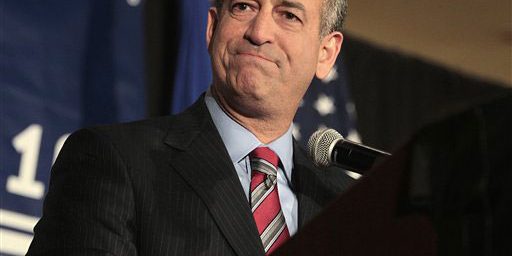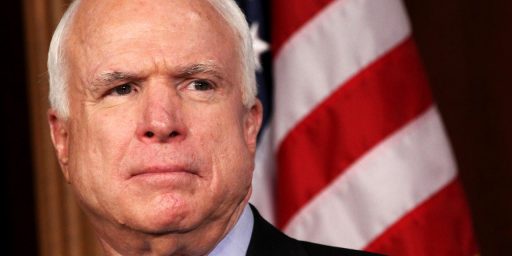Why We’re Refighting Vietnam
John Fund argues that the current nasty campaign climate is partly owing to McCain-Feingold:
It’s fair to say that the so-called campaign finance reform that Mr. Bush signed into law in 2002 will result in more money being plowed into negative advertising during this campaign than ever before. The McCain-Feingold law was supposed to curb the influence of big money in politics. Instead, it has led to an avalanche of money landing in the coffers of so-called 527 groups. The name comes from the section of the tax code that allows independent groups to raise and spend as much as they want on political ads so long as they don’t expressly advocate a candidate or coordinate their campaign with political parties or candidates.
*** Although no one is ever likely to prove coordination between 527s and any political campaign, it doesn’t take a genius to realize that campaign finance reform makes it easier and more convenient for both sides to run nasty advertising while avoiding any accountability for toxic messages. Political parties might not be able to endure the criticism that would accompany the Swift Boat ad questioning Mr. Kerry’s military record or a liberal ad that ties President Bush’s policies to the poisoning of pregnant women. Far from banishing money from politics, McCain-Feingold has merely moved it out of the major parties and into the political shadows, where it is less accountable.
*** Indeed, it is remarkable how so many people who backed McCain-Feingold restrictions on soft money now embrace the 527s that have brought a flood of new cash into politics. Hollywood in particular has fallen in love with liberal 527s, lavishing millions on the groups through donations and concert tours. Chad Griffin, a consultant to Democrats on Hollywood giving, defends the practice: “We’ll never be on equal financial ground with the Republicans, but hopefully, the playing field will be more level than in the past.” This year, liberals now suddenly seem to believe there is no such thing as too much money in politics, as long as it flows to their side. Writer-producer Lionel Chetwynd, a rare Hollywood Republican, says he’s astonished at the hypocrisy he sees: “We’ve opened a Pandora’s box. Anyone who truly believes in campaign finance reform doesn’t do an end run around it.”
It’s true that such groups would exist in the absence of misguided campaign finance reform efforts, since there would be incentive to have plausible deniability on such ads. Still, most people would likely prefer to donate money directly to candidates or parties than proxy groups. The former would almost certainly run cleaner ads.






I am unconvinced of Fund’s basic premise.
Yes, it’s helped accelerate the process to some degree, but the bottom line is that the left has become more vitriolic with each successive election cycle since Reagan.
The reason is simple enough; They see themselves on the losing end.
Bithead- Your point and Fund’s point ain’t mutually exclusive.
I read the comments to suggest that McCain Finegold was to blame for te level of vitriol. I don’t question in the current environment that the law as in force ends up being a channel.
I point hwoever to what’s gone on in the years prior to McC-F being passed, and suggest that it’s been going in that direction without the law. Law or no law, such hatered would find some way out.
So, while McCain/Finegold is at the moment at the center of all the smoke, I question it being tagged as the reason for the fire.
And mind, this is not to suggest the bill was a good one. It seem ed to me at the time overly compromised.
Personally, I prefer negative advertising because it is more honest and generally targeted at specifics, unlike the feel good ads candidates run for themselves. I’m not a fan of campaign finance reform, but if it allows for critical ads while giving candidates cover, it sounds ok to me.